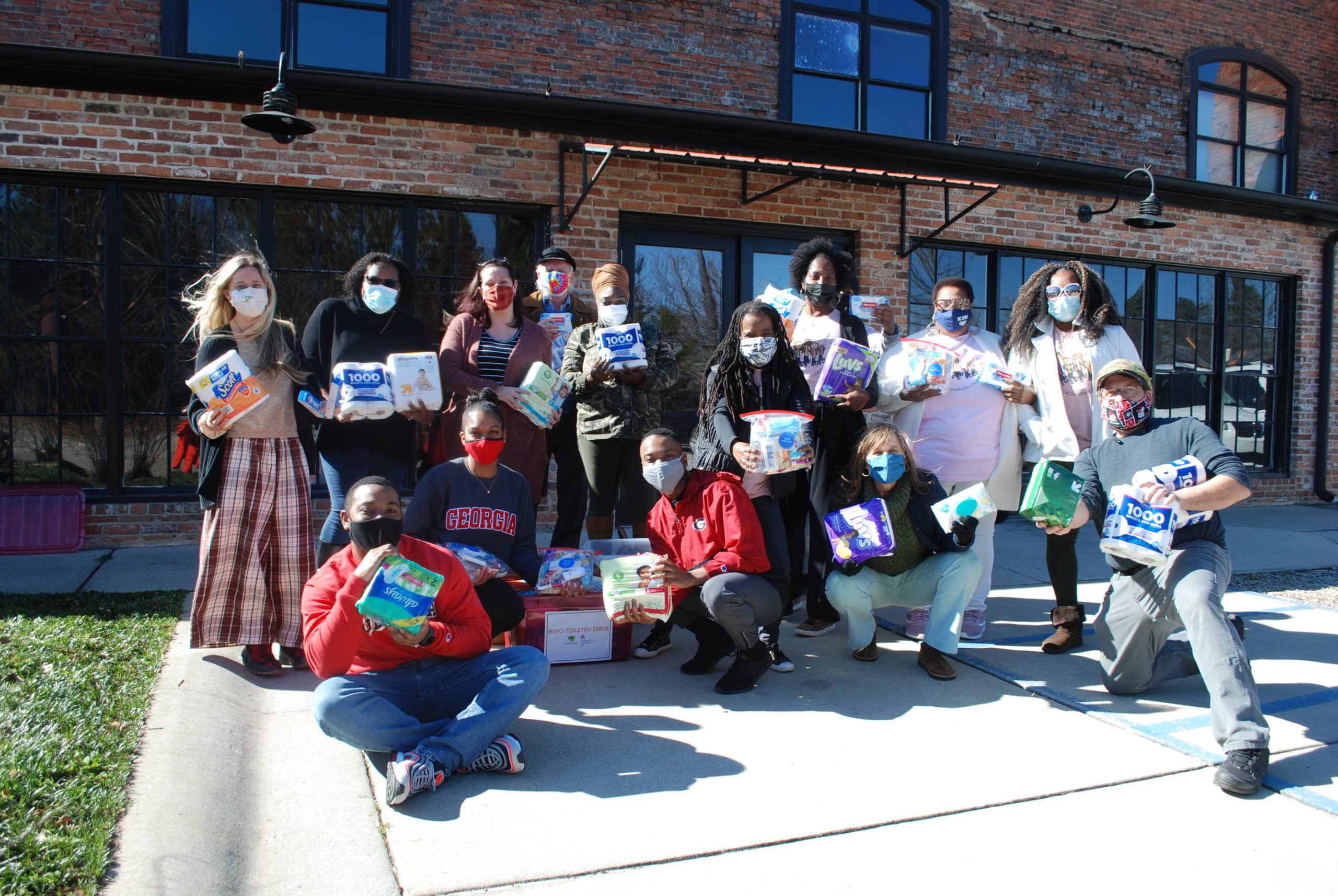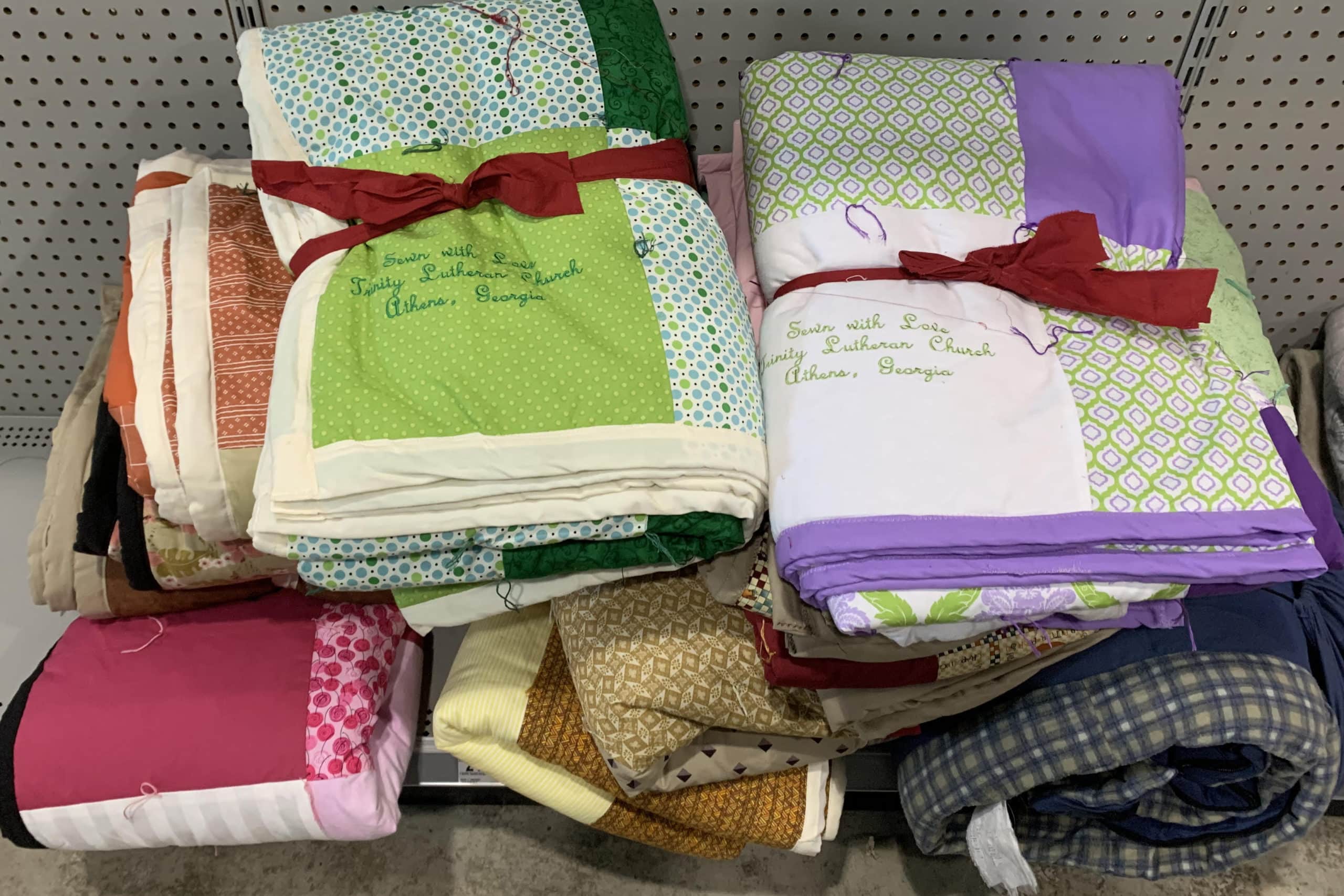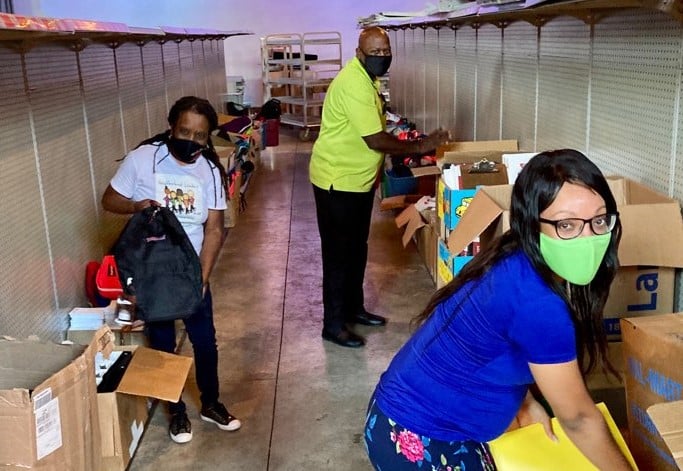Neighborhood Leaders Promote Prosperity in Athens-Clarke County
Print This Post
The Black Student Pharmacist Organization donated supplies for Neighborhood Leaders to distribute to families.
Neighborhood Leaders in Athens-Clarke County are of the community, in the community, and for the community. Their work, led by Family Connection-Communities in Schools of Athens (FC-CIS), is more vital than ever as the COVID-19 pandemic continues to impact communities in the geographically smallest county in Georgia, where 25.7% of the population lives in poverty.
“Already having a culture of collaboration made it a lot smoother to shift into emergency response last year,” said FC-CIS Executive Director Tim Johnson, who has helped cultivate relationships with over 100 Collaborative partners since the early 1990s. “The pandemic has drawn attention to disparities and challenges related to poverty, race, and geography. A lot of people have been living in a state of emergency for years.”
The Athens-Clarke County Unified Government’s Prosperity Package, an initiative of the Mayor & Commission to address poverty, social disparity, and wealth inequality, utilizes FC-CIS Neighborhood Leaders who live and work in 16 “prosperity zones.”
“Each zone is unique, and each Neighborhood Leader brings distinctive perspectives and talents,” said Johnson. “They all help their neighbors identify aspirations and are there every step of the way as they move toward achieving those aspirations—building on assets and addressing deficits or challenges.”
Neighborhood Leaders are focused on group outreach and community building along with individual case management support, helping residents develop an action plan and then following up to offer further assistance. They aim to remove barriers to economic self-sufficiency by helping residents access services and resources, including:
- education (basic adult education, ESL, GED, job training);
- employment opportunities;
- early care and learning, including quality child care;
- support for the aging;
- SNAP and WIC;
- physical and behavioral health services; and
- civic engagement, including census participation, voter registration, voting, and engaging in public processes.
“Neighborhood Leaders are information referrers, community engagers, relationship builders, and connectors,” said Terris Thomas, Neighborhood Leaders program director. “During the pandemic, our focus shifted from prosperity to resiliency. It’s been a lot of information sharing—sharing resources with the residents but also sharing what we’re hearing from those residents at the tables where planning and budgeting occurs.”
Former concert venue Athens Cotton Press was recently converted into a distribution center utilized by the Collaborative’s Neighborhood Leaders and site coordinators. It’s also the headquarters for Athens Eats Together, formerly Meals on Wheels, which assists more than 2,500 households facing food insecurity each week—up from 160 prior to the pandemic.

These “sewn with love” quilts were donated for Neighborhood Leaders to distribute by members of Trinity Lutheran Church.
“The vision is for the center to also provide nonprofit offices with shared training space and more,” said Johnson. “Athens Cotton Press owner Daniel Epting donated the space for the first several months, but we’ll need to cover utilities and other costs to sustain it.”
In addition to the Athens Eats Together food deliveries, the center has received and distributed more than 31,000 pounds of donated fresh fruit, vegetables, and dairy items along with diapers, backpacks filled with school supplies, personal protective equipment, books, clothing, blankets, and other essentials.
An anonymous donor through the Athens Area Community Foundation matched more than $12,500 in individual donations raised within just four days. Through the nonprofit NAEIR, FC-CIS obtained many items to meet basic needs at a fraction of the cost. The center has received over $200,000 retail value of goods.
FC-CIS and the Athens Community Council on Aging identified more than 100 senior citizens who qualified for Meals on Wheels but weren’t enrolled, helped them enroll, then delivered the meals. When Neighborhood Leader Coral Rogers saw that a resident named Joe needed an electronic wheelchair, she secured a donation to acquire one. “If you really need some help, there’s people out there that are going to help you,” said Joe.
The Mayor & Commission recently funded a mobile clinic to do free COVID-19 testing with no appointment required, and Neighborhood Leaders organize the sites. “Thanks to them, we far exceeded expectations for the mobile COVID-19 testing project,” said State Rep. and Habitat CEO Spencer Frye.
Neighborhood Leaders’ efforts are far-reaching. They more than doubled food deliveries with the Immigrant Rights Coalition, secured a $5,000 donation from Charter Spectrum to promote broadband at deep discounts for low-income households, organized outdoor summer outreach events, stepped in as poll workers during elections, and are working on vaccine outreach focused on vulnerable, underserved populations.

This comprehensive support helps bridge gaps one by one. “One person a Neighborhood Leader works with an individual, that person at some point builds the capacity to help someone else,” said Thomas. “In helping one person, you really help five or 10—and, to me, that is community. It’s having a common unity. If you’re helped, I’m helped.”
Athens-Clarke County Mayor Kelly Girtz said the community is strengthened by quality public outreach. “Our 16 Neighborhood Leaders working through partnership with FC-CIS have been a critical link amidst this crisis and will continue to be a touchstone for knowledge and understanding of ground-level human needs,” he said.
Neighborhood Leaders help inform the Mayor & Commission and community partners about systemic barriers to prosperity. Neighborhood Leader Taneisha Brooks organized a virtual webinar called “Breaking the Stigma on Mental Health in the African-American Community,” and all Neighborhood Leaders receive “Bridges Out of Poverty” training hosted by Georgia Family Connection Partnership.
Thomas said the group members will continue to keep their ears out for the voices of the residents as they work toward building a more prosperous community.
“I’m going to cheer for the small successes just as much as the large ones,” said Thomas. “If a Neighborhood Leader helps someone complete an application and that person gets the job—I’m going to celebrate. That’s one more person employed. We can’t change everything in one month or three months. But we can do it one person at a time, one family at a time.”
Contact:
Krystin Dean
GaFCP Communications Specialist
krystin@gafcp.org
Follow us on Twitter: @gafcpnews
Connect with us on Facebook.
Georgia Family Connection Partnership (GaFCP) is a public-private partnership created by the State of Georgia and investors from the private sector to assist communities in addressing the serious challenges facing children and families. GaFCP also serves as a resource to state agencies across Georgia that work to improve the conditions of children and families. Georgia KIDS COUNT provides policymakers and citizens with current data they need to make informed decisions regarding priorities, services, and resources that impact Georgia’s children, youth, families, and communities.
